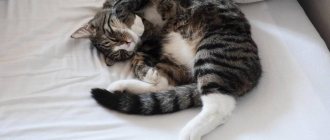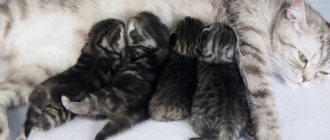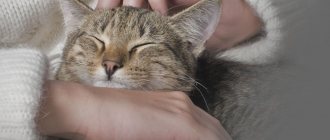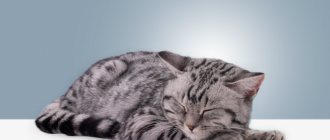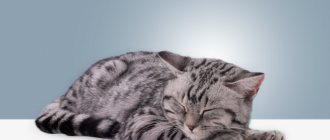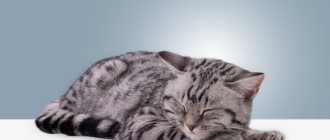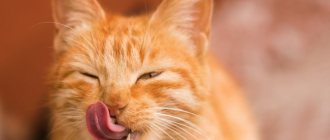- October 16, 2018
- Psychology of relationships
- Sergey Severny
The way cats perceive people often causes offense to humans. After all, in fact, with rare exceptions, cats cannot be called faithful, responsible or so necessary for a modern resident of a metropolis. Despite this, the owner spends a lot of time and effort on his favorite furball, pampering it and playing with it. As with dogs, this psychological bond is dictated by thousands of years of cohabitation, but unlike other examples of domestication, felines have taken a more dominant position, why? The article will talk about how cats perceive people. and what do they mean, supposedly signs of attention to their owner.
A process of domestication that began thousands of years ago
According to various estimates, there are about 600 million cats living on Earth today. Of these, more than 500 are completely domestic breeds that either live with people or end up on the street. All these representatives of the same family were once domesticated, right? Not really. If a person sought to domesticate a wolf or a jackal on purpose, and the type of dog itself can be called selection, then cats became attached to humans deliberately. They chose this way of life because catching, for example, mice in the territory adjacent to a settled village, was a simpler matter than full-fledged hunting. And the rodents themselves never lagged behind people, eating up their waste.
The domestication of cats occurred about 10 thousand years ago and began with the Nubian breed. The process took a long time, but over time, these “tamed” hunters began to follow the person much more often. The domestic cat today still remains close to its wild relatives. It would be a mistake to assume that it is completely tamed. It should also be noted that in an extreme situation such animals can even attack a person, especially if this is required for rescue or feeding. The way a cat perceives people is superimposed on its previous life. A person is seen as a source of more accessible food or a leader with whom the animal shares territory, temporarily, of course.
Is it true that they sense our mood?
Yes it is. Cats are incredibly sensitive to negative energy. They themselves are very uncomfortable and anxious around an upset or sick owner. Sometimes they really behave like people, but they still don’t know how to consciously sympathize. No matter how much we would like to humanize our furry (or not so furry) pets, they are not capable of experiencing such complex emotions as pity and compassion.
They don't know what jealousy and resentment are. And although it seems to us that they show these feelings - for example, when another cat is born in the house - this is a struggle for a resource, instinct forces them to defend the territory and attention of their owners. Cats actually have no shame or conscience .
Although, of course, they have simple emotions (fear, curiosity, anger, joy, satisfaction, anxiety, surprise). Moreover, cats really feel sad and even become depressed if they cannot hide from something bad or stop receiving the usual pleasant stimuli.
The place of cats in mythology and traditions
Often cats are endowed with supernatural powers, for example, communication with the otherworldly. Even a modern intellectual, being late for a meeting, will try to get around the black cat. In Egypt, cats were considered untouchable animals and occupied a very prominent position in society, being in much better standing than, for example, a farmer or a free worker. In one role or another, these animals follow a person constantly, but not out of fidelity. Their motive is completely different, they have adapted, learned to live next to a stronger predator, while remaining virtually free. If this is not manipulation and a sign of a high mind, then who knows what is. It is unlikely that these animals could have had such a huge impact on society by accident.
Experts obtained this data through an experiment.
79 cats (mostly kittens aged 3 to 8 months, but there were also adult cats older than a year) and their owners took part in it. Such an experiment, by the way, has already been carried out with dogs, monkeys and small children.
The scientists left the cats with their humans in a small room for two minutes, after which they asked the bipeds to leave, also for two minutes, and then return again. At this time, the behavior of the tailed animals became the object of observation.
Functions of a cat in the modern world
What is a domestic cat for? Having cast aside emotions, you should look into the abyss of your own rationalism and give an answer to such a simple question. Yes, for some animals have become an outlet, for others - an object of altruism or a way to show their care at least somewhere. But, in fact, why do you need a cat in a metropolis? She doesn't catch mice, and they hardly threaten the clerk on the 8th floor of a high-rise surrounded by other buildings. As a last resort, you can always call an exterminator who will eliminate rodents faster and more efficiently.
The expediency of people taking these animals into their homes, from a rational point of view, tends to zero. Because it only brings costs and complications. Consequently, the need to get a cat is dictated by psychological reasons. The way a cat sees a person is an example of direct integration into society at such a deep level that a refusal to connect with an animal can only appear under the pressure of need, as happens in villages. There cats are given away or drowned because they cannot feed them.
How does a person see his cat?
A small, fluffy bundle of joy - this is how almost every cat lover will describe their animal. There is nothing strange in this, because cats are quiet, calm, and affectionate. Unlike a dog, she doesn’t need to be exercised, she does an excellent job on her own, she doesn’t even need a walk. All this stimulates a person to look into these bottomless eyes, endure bites and scratches, attributing it to the fact that the animal is playing like that and believe in the selfless love of his “lump.” Would a person forgive a dog bite? Maybe the horse’s proud temper and aggression were put on the brakes? No. The only reason why a cat appears in the house is an object of care, sensuality, the “soft” half of a person’s personality, and the animals themselves understand this very well, readily exchanging their life of hand to mouth for the torment associated with the squeezing of the next guest of their “master.”
A cat's perspective
The way cats perceive people can only be summed up in one fact: they ignore people on purpose. Yes, this animal can experience emotions, pleasant or not, towards its owner, but just like in the wild, it will hide it. Why? Because this is a manifestation of weakness, which can be punished in the cruel world of predators. Thus, it is easy to note a direct correlation between the position of the animal and the external manifestation of its connections with humans. The more satisfying and autonomous a cat’s life seems, the weaker it reacts to its owner. The most common answer to the question of why cats like to sleep in public is the direct benefit of the animal, which receives more heat from the owner's body. So, if an animal receives food on time, lives in a warm house and has its own sleeping place, why should it look for additional points of contact with a person?
Cats experience stress from overly affectionate owners
Recent studies of the behavior of domestic cats have yielded an interesting result: it turns out that pets do not always like the caresses of their owner.
Experts from the University of Sao Paulo in Brazil, the University of Lincoln in the UK and the Vienna University of Veterinary Medicine have found that cats often experience anxiety and restlessness from human touch, so in order not to expose it to constant stress, it is better for the owner to avoid frequent stroking and other tactile contact with the pet. favorite
Daniel Mills
As Professor Daniel Mills, one of the leaders of the experiment, explained: “According to our research, those cats who allow themselves to be petted when they don’t like it . Animals that were petted frequently and persistently by their owners had increased levels of cortisol, the stress hormone, in their bodies.
During the experiment, the professor and his colleagues studied the behavior of pets living with people alone, in pairs, and also as part of a group of three or four cats, and it was discovered that, contrary to popular belief, domesticated felines feel just as comfortable in the company of their own kind as if alone. Moreover, young (under two years of age) solitary cats are even more susceptible to stress than their group-living relatives of the same age.
According to Mills, “Many people believe that it is better not to have several cats at once because it will have a detrimental effect on their mental state, but this is not true - animals are so independent and independent that even if they cannot make friends, they will always find a way to avoid communicating with each other."
“The result of the experiment suggests that cat owners should not express their affection and love too vigorously - the animals do not like it. In addition, if you have several cats, make sure that each pet has its own personal space, toiletries and dishes,” concluded Daniel Mills.
"Big Cat"
Scientist John Bradshaw from the Institute of Anthrozoology in Bristol conducted a large-scale study, based on which he came to the conclusion that the way cats perceive people can be explained by the relationship between a younger and an older predator. Simply put, the beloved bundle of joy sees its owner as a big cat with which it shares its territory. The older predator brings food and protects the younger one, while the latter, as it seems to the animal itself, does not give anything in return, because the psychological connection is more characteristic of people.
Thus, the cat simply accepts dominance, remaining virtually free and can leave whenever it wishes. You should not think that this animal is attached to a specific person, since it has a slightly different feeling. It can be described as “the desire to prolong a profitable alliance.” That is, the cat feels “love” for certain qualities, such as: a warm home, protection, constant food, which, moreover, is tastier than hunting products.
Manifestations of “caring”
Often cat lovers are interested in why cats crush people with their paws. Some girls who become attached to an animal even begin to perceive themselves as its “mommy,” which is completely wrong. Yes, with these movements the cat is trying to stimulate the supply of food. In fact, this is an unconscious reflex from distant childhood, when the kitten tried to knead its mother for the flow of milk. As for why a cat lies on a person and purrs, there is a similar explanation given above. Thus, the animal absorbs the warmth of the “senior predator” and remains satisfied with it. Another popular question is: “Why do cats rub against people?” In this case, there is a manifestation of affection as a member of a pride or family.
Naivety of people
Very often people perceive a cat as a very gentle and affectionate animal. This is wrong. If the owner wants a faithful friend, he needs to take a dog; it is much more distant from its wild ancestors than cats. No, this does not mean at all that you should not take cats into your home, especially homeless ones. You just need to immediately understand that these animals will not fully look into a person’s eyes with love. Yes, they are devoted to a specific house, since most often they consider it their territory. They are good to play with, and the purring of a kitten is the best antidepressant. But if such a “lump” goes to the neighbors or just for a walk, you shouldn’t tear your hair out, the cat just always remains free.
I am the center of the universe
No matter how much a kitten or cat caresses its owner, it perceives itself as the center of the Universe, and everyone else as servants. The animal does not know where the pillows with pleasant filling, sausages, sausages and other products come from; in addition, they may have their own gastronomic preferences. Cats usually love those who feed them, but they can also show favor to the family member who plays with them, pampers them, and even sleeps with them. It has been proven that cats have a great sense of energy and cannot stand those who are used to screaming, fighting and swearing, trying to hide from them as far as possible. If a cat feels affection for one family member, it means that he perceives him as a kind person, if he doesn’t love someone, he perceives him as evil and does not hide his true feelings behind a mask of politeness. There are known cases when cats, affectionate towards all family members, hissed and rushed at those who might be hostile to the owner of the house.
READ ALSO: 11 cruel rulers in history
Interesting Facts
Few people know, but cats “communicate” by meowing only with humans. Thus, it is easy to note that felines' intelligence is more advanced than most people imagine. In addition, these animals know how to manipulate people. It’s worth taking a closer look at your fluffy little one, who has once again come up to rub against his legs; perhaps he has run out of food in his bowl, and the cat itself knows that a treat will follow the show of affection on its part. Too much care causes psychological torment to the animal. This especially affects how cats perceive children. You shouldn’t constantly cuddle the animal; it is still wilder than its other domesticated “brethren.”
Coupled with the fact that the cat was domesticated independently, this makes this category of pets simply “cohabitants” with humans. Don’t deceive yourself into thinking that this particular cat is loyal and understanding. However, all of the above does not negate the fact that fluffies are extremely affectionate and playful. It is quite possible that this is what makes them so beautiful in human eyes.
What does a cat think about and how does it perceive us, people. Do we know anything?
All of us, cat owners, periodically ask ourselves this question. So John Bradshaw, the author of several books about cats, who spent 25 years studying their behavioral reactions, tried to answer it. And this is what he managed to find out.
A cat perceives a person not as a friend or owner, but as a similar creature. Only big, not graceful enough and clumsy, capable of tripping over a cat several times a day, missing the moment of its appearance underfoot.
All thoughts of cats are determined by their natural needs. Their thinking is situational. If a cat wants to eat, she builds her behavior in such a way as to get what she wants as quickly as possible, and uses the usual methods: she gives her voice to the owner, spins around, approaches the bowl and meows persistently. She doesn’t think about how to better beg for something tasty, but acts based on the situation.
The behavior of an animal largely depends on its upbringing: some will start jumping on the table or stealing food from a set table, while others will patiently wait for the person to take out the food and fill the bowl. A hungry animal can express its joy and pleasure at what is happening by rubbing itself against our legs and purring loudly.
By the way, rubbing against a part of the body indicates the cat’s disposition towards you. Not everyone receives this honor. The cat has an idea of someone as a friend, while someone is indifferent to her, or even serves as a hindrance.
Living in an apartment, the cat thinks that this is its full habitat. It is very difficult to convince her otherwise; you can only correct her behavior using educational methods. For example, stop him from climbing on the table or sharpening his claws on the upholstery of the sofa.
A cat thinks of a person as a stable element of its living space. This differs from dogs, whose thinking lacks “object constancy.” That is, when a person disappears from a dog’s sight, it is a lot of stress for her; she does not understand where he disappeared, whether he will return or not. The cat is not tormented by such thoughts precisely because of its ability to perceive its familiar environment as a constant value.
Wanting to get their share of affection, cats climb on us, touch us with their paws and purr. This is exactly what they do with the mother cat; they did not invent any new ways to attract a person’s attention.
Cats have well-developed cognitive abilities. They often copy the behavior of people, becoming like them. If in a family every action is accompanied by a comment, then the cat will most likely also comment on its actions and movements, making characteristic sounds.
Cunning furry creatures easily remember how to get food by watching a person. Therefore, if necessary, they themselves open cabinets with edible supplies.
Cats think that the territory of the apartment is their undivided use, therefore, playing hunters, they do not think twice about destroying flowers, vases or other interior items. This is what the game requires, they don’t feel any regrets or guilt. They guess the seriousness of what they have done only by the stern tone of the person. Many cat owners are confident that their pet is even capable of apologizing for what happened, but, most likely, the cat is driven not by repentance, but by the risk of being left without food or the usual portion of affection.
Despite their outward independence, cats become attached to us and undoubtedly love us. They are not as emotional as dogs, who each time they return again experience deep joy from meeting each other. Cats realize that humans are a constant quantity, so they show their emotions in doses, depending on their mood.
1111

